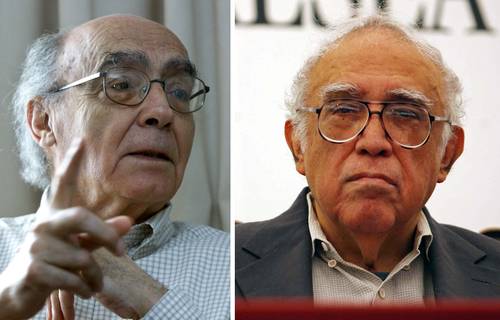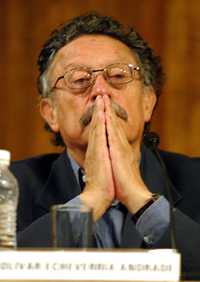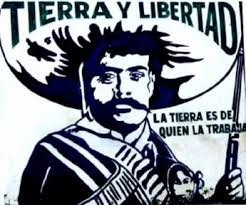![]()
La pugna dentro de la Asamblea Popular de los Pueblos de Oaxaca (APPO) por definir las tácticas de reorganización, después de la represión del 25 de noviembre pasado, y la lucha por tener la hegemonía al interior del consejo de la APPO (instancia creada para estructurar a la organización) han tenido varios matices y han generado inconformidades. Después de un periodo de rearticulación, el consejo, en un primer intento por reactivar el movimiento, convocó a la Primera Asamblea Estatal de la APPO los días 10 y 11 de febrero de 2007. En dicha asamblea el tema principal impuesto por los tiempos era el tema electoral, debido a la cercanía de las elecciones para renovar el congreso del estado el próximo 5 de agosto y 148 de las 570 presidencias municipales el 7 de octubre. Previamente a dicha asamblea, un sector del consejo de la APPO ya había tenido reuniones con dirigentes del Frente Amplio Progresista (FAP) por el tema electoral, incluso habían sacado una lista provisional de candidatos, inconformándose una parte del consejo, al considerar que la decisión de participar en las elecciones debía ser tomada en el pleno de la Asamblea Estatal. Por ello la discusión sobre el tema electoral fue larga, perdiendo de vista los otros puntos para los que también había sido convocada la asamblea. Había la posición de participar en la elecciones argumentando una cuestión táctica en la lucha contra el gobernador Ulises Ruiz, por la transformación del Estado y por la libertad de los presos políticos, tomando el congreso estatal como un frente mas de lucha. Otra parte consideraba que la participación en las elecciones significaba no sólo una traición a los principios de la APPO sino también una falta de respeto a organizaciones que se mantenían al margen de las elecciones, pues la lucha era mas allá del terreno electoral. Las organizaciones con esta posición cosideraban que la APPO no era una trampolín político sino un movimiento social. La discusión llevaba entrampada toda la noche del domingo 11. Entrada la madrugada del lunes 12 de febrero, y con la una asamblea reducida debido a que muchos se marcharon desgastados por la discusión, la delegada Guadalupe García Leyva atacó la posición de los delegados que se negaban a participar en las elecciones. Miembro del Colectivo 2 de Marzo y de la Coordinadora de Mujeres Oaxaqueñas (COMO), García Leyva acusó directamente a David Venegas Reyes, “Alebrije”*, de querer boicotear la asamblea, así como de ser policía. David era miembro de la mesa de debates de la asamblea y como miembro del consejo había participado de una reunión previa para discutir la posición electoral, y en una reunión del consejo con un representante del FAP, en la que mostró su inconformidad desde el primer momento. Varios delegados se enardecen al escuchar este tipo de acusaciones; la plenaria estuvo a punto de romper la asamblea. Pero al tocar el turno del micrófono a David para ejercer el derecho de réplica, Venegas Reyes dijo simplemente que “esas acusaciones sólo eran muestra de que la parte electoral de la APPO se queda sin argumentos para poder defender su postura”, y que no iba a responder esas acusaciones pues no tenían mayor sentido por ser falsas. Luego de superar esta crisis, la plenaria acuerda no participar en las elecciones como APPO. Si las organizaciones deciden participar del proceso electoral en Oaxaca, lo harán de manera individual, sin hacerlo a nombre de la APPO. Además, tienen que impulsar candidaturas populares y aquellos consejeros que busquen una diputación tienen que renunciar a su cargo en el consejo. Después de la represión del 25 de noviembre la persecución no era generalizada contra todos los consejeros (aunque así había sido difundido en los medios para generar miedo). Era selectiva. Aunque también se persiguió y se sigue persiguiendo a lo barricaderos o a algunos colonos que participaron activamente en el movimiento. Muchos de ellos tuvieron que salir de Oaxaca a causa del ambiente represivo impuesto por el Estado. A los que fueron recluidos los acusaron de varios delitos, como sedición, asociación delictuosa, ataques a las vías de comunicación, entre otros. Los coordinadores de las principales barricadas, entre ellos el “Alebrije” Venegas, se resguardaron por algún momento sin perder el contacto con el consejo de la APPO. Desde arriba en la estructura de gobierno inicia una fase de negociación con algunos dirigentes de organizaciones adheridas a la APPO. La táctica del gobierno de Ulises Ruiz cambia: por una parte negocia y por la otra criminaliza a aquellos con los que no puede negociar. En este contexto, el pasado 13 de abril Venegas fue detenido en inmediaciones del Parque El Llano en forma violenta. Según versiones de sus compañeros, su detención era una táctica del gobierno del estado para frenar el activismo que el “Alebrije” había tenido dentro de la recién constituida Voces Oaxaqueñas Construyendo Autonomía y Libertad (VOCAL): recientemente habían sacado una publicación llamada Barrikada, que iban a presentar en el Instituto de Artes Gráficas de Oaxaca (IAGO) esa misma noche, al igual que una radio en FM denominada “Radio sin mando”. Sin contar con que la agrupación estaba trabajando dentro del consejo para frenar a los miembros que negociaban candidaturas. La detención fue arbitraria, pues no hubo orden de aprehensión de por medio. David fue detenido el 13 de abril por la tarde y fue presentado en la Unidad Mixta de Atención a Narcomenudeos (UMAN) doce horas después de su detención. La gente que pudo visitarlo denunció que había sido golpeado, versión confirmada posteriormente por una foto publicada en ADNSureste, en la imagen también aparece una bolsa con supuestamente 30 gramos de heroína. Hasta ahora, no hay elementos comprobar la versión de que al momento de su detención portaba dicha bolsa. Trasladaron al “Alebrije” la mañana del 15 de abril a la penitenciaria de Ixcotel, después de haber permanecido un día en instalaciones de la Procuraduría General de la República (PGR). Y ahí fue enterado de otra orden de aprehensión en la que los acusan de sedición, quema de edificios y “desobediencia a particulares”, por los sucesos del 25 de noviembre de 2006, cuando fue incendiado el Tribunal Superior de Justicia de Oaxaca. Por estos delitos están también acusados varios integrantes del consejo estatal de la APPO. Desde unas semana antes de la Primera Asamblea Estatal de la APPO, el Frente Popular Revolucionario (FPR) había construido una serie de alianzas para fortalecer su postura electoral. Se aliaron con un sector de la Coordinadora de Mujeres de Oaxaca “1ro. de Agosto” (COMO), la Coordinadora Democrática de Magisterios, el Colectivo 2 de Marzo, el Frente Amplio de Lucha Popular (FALP) y Nueva Izquierda Oaxaqueña, entre las más importantes. Además de reactivar varios componentes del FPR: la Unión de Juventudes Revolucionarias de México, la Unión de Campesinos Pobres y la Unión de Trabajadores de la Educación. Todas estas organizaciones están coyunturalmente impulsando candidatos a diputados utilizando las siglas de la APPO. La forma de operar del FPR no es directa, lo hace a través de los integrantes de su bloque, quienes emiten rumores que posteriormente el FPR respaldará con declaraciones o acciones. Como ejemplo están las acusaciones que hizo Guadalupe Leyva a David Venegas por negarse a compartir la opinión electoral y convertirse en el principal opositor de su postura. En las reuniones de consejo, con otros grupos, en la reuniones con colectivos o colonias, se repetían los rumores en contra de Venegas y otros integrantes que conforman VOCAL. Tácticas desinformativas que generaban desconfianza al interior del consejo y que fortalecían la posición del bloque del FPR. Al ser detenido David Venegas, el vocero de la APPO Florentino López, miembro del FPR, sólo en una ocasión emitió un comentario indirecto a la detención, cuando manifestó que “se reactiva la ofensiva en contra de la APPO porque ahora suman 43 los presos políticos del conflicto social”. Fuera de esa declaración, y a pesar de la movilización internacional por la libertad de David, el vocero ha permanecido en silencio. Analizando lo sucedido en su programa de Radio Escopeta, la doctora Bertha Muñoz denunció por su parte el aislamiento y la desinformación al que la orillaron miembros del mencionado bloque político. “Al estar en el exilio la información llegaba filtrada por parte del consejal Felipe Canseco, argumentando que la detención del ‘Alebrije’ era una finta del gobierno para acallar los rumores de que era policía”, explicó con más detalles la Dra. Escopeta. La doctora también hizo declaraciones en el sentido de que el FPR habría tenido reuniones con Lopez Obrador a nombre de la parte electoral de la APPO y convocó a la organización a “cerrar filas y limpiar la casa”. Hasta ahora, el bloque electoral encabezado por el FPR, pese a las negociaciones con el FAP, apenas ha logrado afianzar a un candidato en la lista plurinominal por dicha coalición. Zenén Bravo Castellanos quedó ubicado en el numero 10 de esa lista, y permanece en duda la candidatura de Carmen Jicayan. El Frente Amplio Progresista no cedió candidaturas a los miembros de la APPO en las diputaciones por mayoría relativa. Mientras las pugnas siguen al interior de la APPO, el consejal por las barricadas David Venegas ha emitido varias cartas desde el penal, denunciando su detención y haciendo análisis del movimiento desde su perspectiva. A partir del apoyo internacional que ha pedido la Otra Campaña por la libertad de David, pues es adherente a dicha iniciativa, ha recibido amenazas en la prisión para forzarlo a negociar y desmovilizar a los que piden su libertad, según la denuncia que hace en una carta del 2 de mayo del año en curso. El movimiento por su liberación generó también un cuestionamiento hacía las tácticas del FPR como organización. El Subcomandante Marcos, en un comunicado leído el 6 de mayo pasado en el Foro Nacional Contra la Represión, apoyó al “Alebrije” y denunció al FPR como una organización política “de supuesta izquierda… que se dice adherente a La Otra Campaña cuando le conviene, y se deslinda y toma distancia cuando no es así. Estas personas no se esperan a tomar el Poder para perseguir a anarquistas y libertarios, sino que, aliados a quienes dicen combatir, persiguen a los y las que piensan diferente y tienen y luchan por otra idea de sociedad futura”. El martes 15 de mayo, durante la manifestación conmemorativa del día del maestro en Oaxaca, se leyó en pleno centro de la ciudad la carta de David Venegas donde expresa su inconformidad y manifiesta la traición de algunos consejales de la APPO al movimiento, así como las irregularidades que atestiguó antes y después de su detención. El “Alebrije” también detalló en su misiva la criminalización de que son objeto sus compañeros de VOCAL y la complicidad con ella que han establecido los miembros del FPR. Después de esto, y de no haber obtenido todas las candidaturas que deseaba el bloque electoral, la pelea en Oaxaca para tener el control del consejo de la APPO se ha recrudecido, aunque también por fuera se siguen movilizando sectores para apartarse cada vez más del consejo, impulsando sus propias iniciativas pero sin perder las raíces de la APPO. Así está iniciando “otra fase del movimiento”, como dijo la Dra. Bertha Muñoz en Radio Escopeta, y a la que ella se suma denunciando la actitud del FPR, pero sobre todo llamando a la reorganización y proponiendo la convocatoria a una nueva asamblea estatal de la APPO. Veremos ahora lo que sigue… There is a struggle within the Peoples’ Popular Assembly of Oaxaca (APPO in its Spanish initials): how to reactive and reorganize the movement after the brutal repression the people suffered on November 25, 2006. Part of this includes a fight for hegemony within the APPO’s council (a body created to give the organization structure) and it’s a fight that has had several matrices and has generated great disaccord. After a period of re-articulation, the council’s first attempt to reactive the movement was to convene the First APPO State Assembly for February 10th and 11th, 2007. The main issues to be debated were the upcoming August 5th Congressional elections and the October 7th elections in which 148 of the 570 municipalities would new government representatives. Before this assembly took place, one sector of the APPO council met with the leaders of the Broad Progressive Front (FAP in its Spanish initials) regarding the elections. The council members had created a provisional list of electoral APPO candidates—going against the rest of the council which believed that whether or not the APPO would participate in the elections ought to be decided by the entire Assembly. In light of this prior meeting, the discussion during the February State Assembly concerning elections was long and overshadowed all other agenda issues. This electoral question was a tactical concern for the group. In the long run, the struggle was against Governor Ulises Ruiz, for the transformation of the state and for the freedom of political prisoners. Some believe that Congress could be a battle ground and that APPO should enter. But others argued that participating in elections betrayed APPO’s fundamental principles and was disrespectful to member organizations who believed that the struggle should not enter the electoral ring. These organizations stated that APPO can’t be allowed to turn into a launching pad for politicians. The discussion remained deadlocked on the night of Sunday the 11th. When dawn broke, many assembly members had already left, exhausted by the endless discussion. Member of the March 2nd Collective and of the Coalition of Oaxacan Women (COMO), delegate Guadalupe García Leyva had been attacking those who refused to participate in the elections. She also accused accused prominent APPO council member David Venegas Reyes—know as Alebrije*—of being a police plant. David was a member of the Assembly’s debate roundtable and as a council member, had participated in the previous meeting where the elections question was debated. Also as a representative of the FAP, he made clear at other moments that he did not agree that APPO should take the electoral road. Several delegates became furious on hearing Garcia Leyva’s accusations—to the point that it almost tore the APPO in two. But when it was his time to speak, Venegas Reyes stated: “these accusations only demonstrate that those APPO representatives who favor electoral advancement have no real arguments on which to defend their position,” and that since the accusations were obviously false, he would not respond to them directly. After getting over this crisis, the session agreed that the APPO as an organization would not participate in the upcoming elections. Member organizations who decided to take part in the electoral process, would have to enter separately and not under the APPO name. In addition, any councilperson seeking election would have to resign from the APPO council. After the November 25th repression, APPO council members began to be persecuted. Despite the fact that the media was saying that all council members were subject to persecution indiscriminately, the truth is that the persecution was selective and included many of the people in charge of the blockades as well as active community members. Many were forced to leave Oaxaca because of the state-imposed repressive environment. Those detained were accused of various crimes including sedition, criminal association, and attacking outlets of communication, to name a few. The coordinators of the main barricades—among them Alebrije Venegas—took measures to protect themselves but maintained contact with the APPO council. But a new phase had begun in which high government officials negotiated were negotiating with some parts of the APPO. Ulise Ruiz’s government would negotiate on the one hand, and criminalize those who refused, on the other. It was in this context that Venegas was violently detained on April 13th near the El Llano Park. According to his comrades, his arrest was the government’s attempt to paralyze Alebrije’s activism within the newly created group, Oaxacan Voices Building Autonomy and Freedom (VOCAL in its Spanish initials). He had recently released a magazine named Barrikada and was planning on presenting it that same night in the Institute of Graphic Arts of Oaxaca (IAGO) and on the FM station “Radio sin mando.” He was also working within the APPO to prevent the dealing of electoral nominations. His arrest was arbitrary; there was not even an arrest warrant issued. Twelve hours after his April 13th detention in the afternoon, David was brought before the legal body that deals with small-time drug offenses—the Unidad Mixta de Atención a Narcomenudeos (UMAN) in Spanish. Those who visited him during that period reported that he had been beaten—a claim confirmed by a photograph published later in ADNSureste. However the photograph also showed him with a bag that supposedly contains 30 grams of heroin, though to this date there is no proof that he was in possession of that bag at the time of his arrest. On the morning of April 15th, after having spent one day in the custody of the Office of the National District Attorney, Alebrije was moved to the Ixcotel penitentiary. There, he was told that there had been another capture order issued for him—one that charged him with sedition and arson in relation to the November 25th burning of the Oaxaca Superior Courthouse. Many other APPO leaders are still being held on charges relating to this day. During the weeks prior to the First APPO State Assembly, the Popular Revolutionary Front (FPR) had forged a series of alliances in order to strengthen their support for engaging the APPO in elections. Among their most important allies were the August 1st contingent of the COMO, the Democratic Coalition of Teachers, the March 2nd Collective, the Broad Popular Struggle Front (FALP) and the New Oaxacan Left. They also revived parts of the FPR—such as the Union of Mexican Revolutionary Youth, the Union of Poor Campesinos and the Union of Educational Workers. All of these organizations were, for the time being, carrying forward congressional candidates under the APPO name. FPR operates indirectly: members of their group start rumors which the FPR later affirms with declarations or actions. Guadalupe Leyva’s accusations against David Venegas for his non-agreement concerning elections and for becoming her principle opposition is just one example. During council meetings, meeting with other groups and in neighborhood gathering, the rumors against Venegas and other VOCAL members were repeated. FPR relies on these types of mis-information schemes to generate mistrust within the APPO council and to strengthen the FPR block. APPO spokesman and FPR member Florentino López, mentioned David Venegas’s arrest only once: “The anti-APPO offensive has been revived because there are now 43 political prisoners,” he stated. Despite the international mobilization to free David, the spokesman has stayed silent on the issue aside from this brief, indirect acknowledgement. Analyzing this situation on her program Shotgun Radio, Doctor Bertha Muñoz explained her experience with being isolated and thus subjected to such mis-information campaigns: “While in exile, news only comes filtered by council member Felipe Canseco—like that Alebrije’s arrest was a government hoax to quiet the rumors that he was a member of the police.” The Doctor also made declarations that the FPR had held meeting with Lopez Oprador on behalf of the APPO and that it had called on the organization to “close ranks and clean-up its own backyard.” Despite all this and its negotiations with FAP, the FPR-led electoral block has thus far only managed to get one candidate on the Congressional plurinominal list. Zenén Bravo Castellanos is number 10 on the list and Carmen Jicayan’s nomination is still in doubt. Given the way elections work, this essentially means that the APPO members have almost no chance of entering Congress. As the APPO’s internal struggle continues, council member David Venegas has written several letters from jail, speaking out against his incarceration and analyzing the movement. There has been international outcry demanding David’s release but David has also received threats in prison to force him to negotiate and quiet those who call for his freedom, according to a May 2nd letter he wrote. The movement for his liberation also caused concern regarding FPR’s organizational tactics. In a public statement read on May 6th in the National Forum Against Repression, Zapatista leader Sub-Commander Marcos announced his support for Alebrije and criticized the FPR as a political organization “supposedly left-wing…that claims it agrees with the principles of the Other Campaign when it’s convenient but then distances itself when it’s not. These people are not looking for power to be able to persecute anarchists and libertarians because they are already persecuting others—they are persecuting those that think differently and those that have and struggle for a different vision of society.” During the demonstration commemorating Day of the Teacher in Oaxaca on May 15th, one of David Venegas’ letters was read publicly in the heart of the city. In it, he expresses his unease, calls attention to the fact that some of the APPO council members had betrayed the movement and points to some of the odd happenings he witnessed before and after his arrest. Alebrije also described the criminalization of his VOCAL comrades and the FPR’s complicity in the face of these drastic situations. After all this, and after the failure of the FPR to obtain any well placed electoral nominations, the fight in Oaxaca for control of the APPO council has worsened. Yet it’s important to note that the bases continue to mobilize and create their own initiatives that stay true to APPO’s roots. It’s in this context that Dr. Bertha Muñoz commented in Shotgun Radio, that the “other phase of the movement” has begun—one in which not only FPR’s actions are publicly denounced, but also in which reorganization is needed and a new APPO State Assembly ought to be convened. We will soon see what happens…
Inventando criminales
El “poder” de la cizaña
“Alebrije” tras las rejas
ENGLISH VERSION![]()
Inventing Criminals
The Power of Sowing Disaccord
Alebrije Behind Bars
ENVIADO POR EMAIL POR "el disidente"
























![Validate my Atom 1.0 feed [Valid Atom 1.0]](http://www.blogger.com/valid-atom.png)
![Validate my Atom 1.0 feed [Valid Atom 1.0]](valid-atom.png)


No hay comentarios:
Publicar un comentario
hola